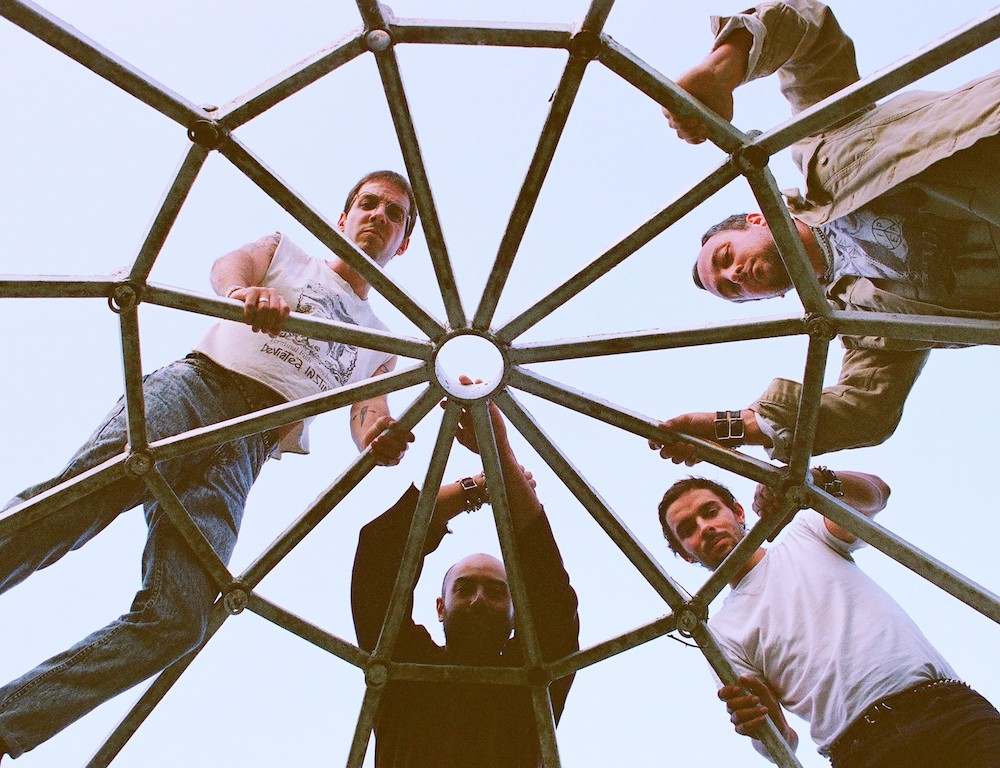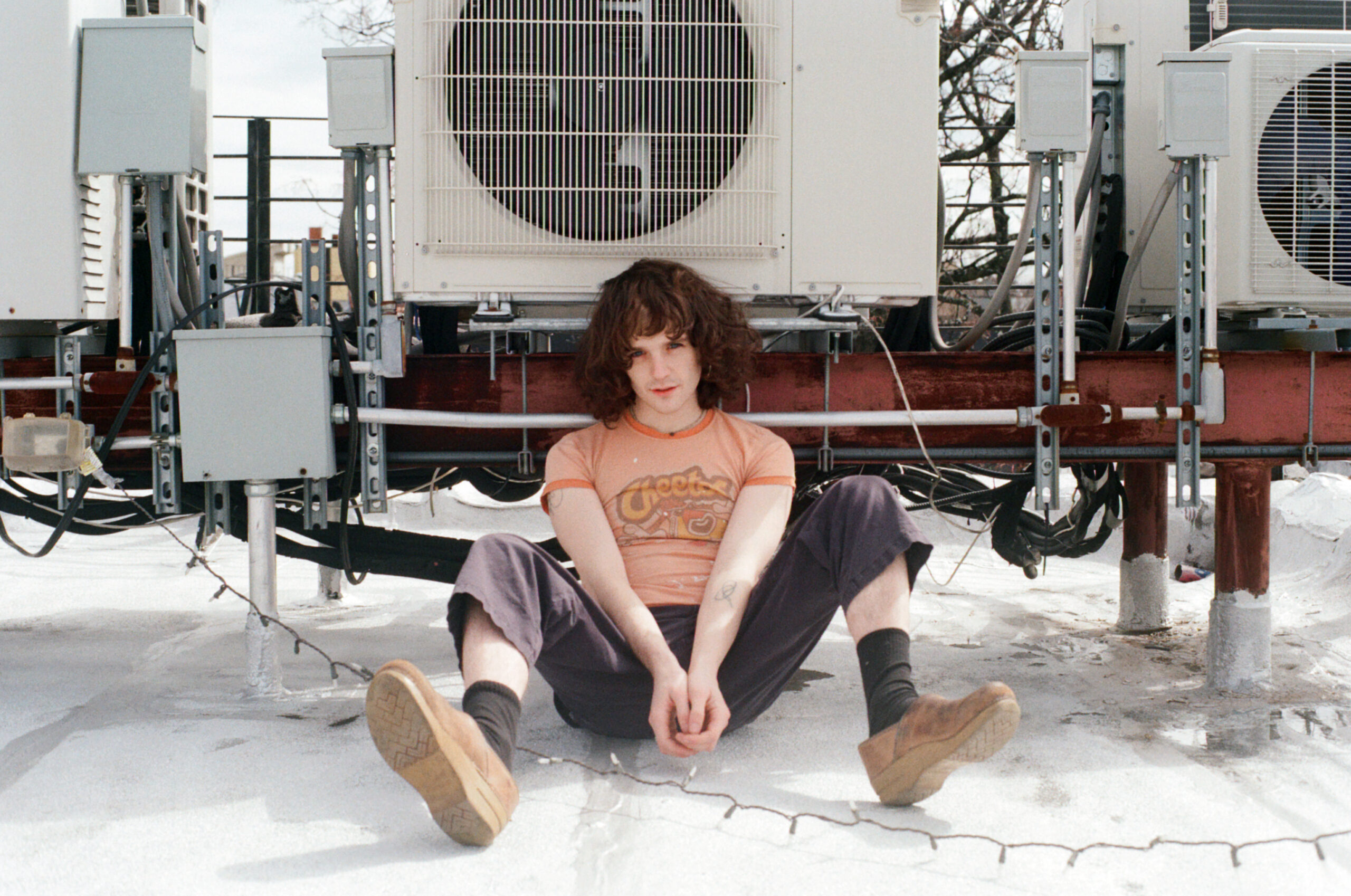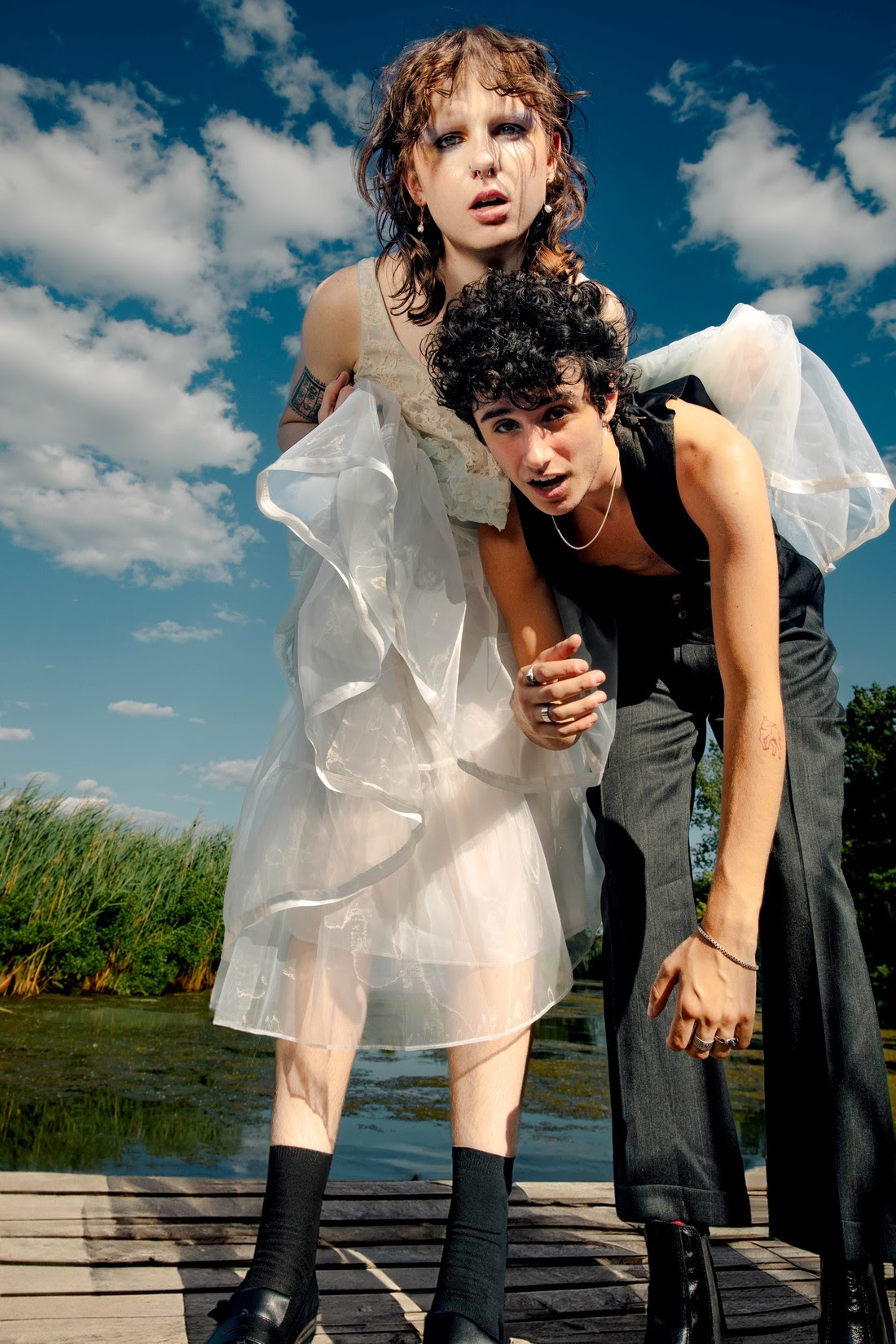A YouTube upload of a Poison Ruïn live set in Queens describes the band as "sound[ing] like they reside and rehearse in a dark medieval dungeon." Not quite — the band was born in a Philadelphia warehouse basement rehearsal space — but that sound is very deliberate. Frontman Mac Kennedy, who initially conceived the band as his own recording project, is something of a history and fantasy genre enthusiast. Across their discography, including on their new sophomore album Härvest, the band pairs the imagery of that world with murky, dirty anarcho-punk. It's not escapism, but the opposite — laying bare the throughline of brutality and oppression from the Dark Ages to our modern life.
"The idea was that I wanted to have a project that had a wide range of sound, but therefore needed something to unify it," says Kennedy, speaking from home alongside drummer and roommate Allen Chapman. "I was trying to figure out some kind of symbolism or overarching idea that could tie everything together — musically, lyrically, and with the [visual] art."
Grim new single "Torture Chamber" is one of the album's simplest and most effective songs. Kennedy's vocals are gruff and gnarled as he barks: "Trapped in the torture chamber/ Tightened chain/ Suffering." The album's title track uses the idea of a peasant revolt to speak to modern class struggle and revolution; "Tome Of Illusion" examines the construction and exploitation of religion; "Blighted Quarter" is about the hope and resistance that can shine through in communities left to suffer — and while the talk of non-arable land and carrion and vultures is in line with the medieval theme, the message beneath it was inspired by very real parts of modern Philadelphia.
"We're sold a lie of linear advancement or progression through time, which is just fundamentally untrue," Kennedy says. "We look at [medieval] times as symbols of brutality and toiling and daily struggle; people turning to religion or intangible things as a way to cope or carry through. And all of those things are as present and constant in everyone I know's daily lives as whatever peasant with a hood on is being imagined."
Kennedy grew up in small-town Maryland, where despite the proximity to Baltimore and DC there was little in the way of a punk or arts scene. "Not to say there aren't small towns that have great music scenes, but ours was very tentative — if one person was doing stuff and then sorta dropped out it would dry up and disappear," he says. Instead, he found out about punk rock through documentaries and liner notes, and his first awakening to leftist politics was in the lyrics of Dead Kennedys records.
Meanwhile, Chapman comes from Binghamton, New York, where he loved Metallica and the Ramones, and from there discovered bands like the Misfits and Discharge. His own politics started at home — "My dad would get wasted and just rave about how much he fucking hated George Bush" — and were bolstered when some older friends from school introduced him to the concept of a DIY scene.
Both of them ended up in Philly by their early 20s, drawn to the thriving music scene and cheap rent. Poison Ruïn began at the start of the pandemic, when Kennedy finally found the time to flesh out some of the musical ideas he'd been kicking around, resulting in the project's debut EP, recorded in March 2020 and released the following month. When his friends in Philly heard the demos, they were excited enough to ask to be in the band — the lineup is completed by guitarist Nao Demand and bassist Will McAndrew. "We started practicing in probably September or October of 2020, and this wasn't even necessarily with the intention of being a band," says Kennedy. "I think we all quietly aspired and hoped to do that, but it wasn't a time of particularly wanting to make optimistic predictions about the future or what you were gonna do with your time."
Their first gig was a parking lot benefit show in July 2021. "I've never been so ready for a first show in my entire life. We were coming together twice a week and practicing a lot for 10, 11 months before we played our first show," says Chapman. After that, excited whispers about the band spread beyond Philly, and they started to tour further afield, including hitting the West Coast. Part of the appeal was their forceful and driving live show. "I feel like when you're really present with live music, a lot of the time it has to do with the band just being really on the edge of what they're doing, just pushing as far as energy, so we were trying to do that," says Kennedy. "Some bands it's like headphones and extra people strumming and just really trying to recreate a recording, and that was not the interest. We prioritize just allowing the live band to be its own thing."
Härvest, the first collection of songs written as a full band, was recorded and mixed entirely by Kennedy (mastering was by Power Trip and Xibalba collaborator Arthur Rizk). It brought out some perfectionist tendencies, he says. "It took a long time to mix it because I was definitely more self-aware this time. I think Allen remembers one time — we live in the same house, and our bedrooms are just on either ends of a hallway. I walked down the hallway, I was practically in tears, and I was like, ‘Dude, I feel like I need to start this whole thing over. I'm going insane.' And I didn't, I just saw it through. [But] when you're making a follow-up to something, there's a little more sweating." The sound he ended up with is so lo-fi it's almost suffocating, emphasizing the image of a dark and brutal reality as it obscures and chokes the explosive instrumentals. "I think it gives it this quality where it's kind of like an artifact. It's like listening to recordings that feel like they're lost," he says.
From the sonics to the album artwork — a chainmail-clad peasant holding a scythe, a peace-sign mace dangling from the band logo — there's a deliberate, holistic crafting of the band's identity. An idea of reclamation was important to the band, Kennedy says: "Most created worlds and things like that have a lot of ideology intentionally or unintentionally implanted in them. And part of that is trying to be aware and control that. This stuff does get used symbolically for extreme right type of stuff. And that's just a no-brainer — provide the opposite, push back against it. If something can be taken on one side of a coin to say something, it implies the other side."
"With the right wing stuff in extreme music, especially NSBM and stuff like that, there's a lot of hidden dog-whistling within it too," adds Chapman. "It's just like, okay, there's this little rune in the corner over here, is this the good rune or the bad rune? There's a lot of cowardice in that. But I think aesthetically for [our] stuff, there's no hiding anything — it's like, here's these known symbols for equality and peace and solidarity. It's very within the text."
"Yeah. Obviously those folks are irredeemable scumbag pieces of shit, but they're also fucking losers. That's nerdy garbage, we hate it," says Kennedy.
There's nothing too self-serious about Poison Ruïn; the theme they play with is fun and a little silly, and they know it. First and foremost, their music is a good time. But the desperate relevance of their political message is worth heeding, if you can make it out through the muck. "You think about revolution as a complete overthrow of an entire system," says Chapman. "But thinking about the way that stuff starts ... it's not the knight in shining armor, not the member of the imperial court, not the one that's knighted by the republic. It begins at the fields, because society doesn't exist without somebody that tills the fields. And it's pointing the focus at that type of solidarity. It's about the person that wasn't given his horse, he had to train his horse."
Härvest is out 4/14 via Relapse Records.






